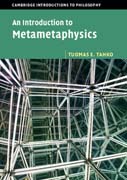
How do we come to know metaphysical truths? How does metaphysical inquiry work? Are metaphysical debates substantial? These are the questions which characterize metametaphysics. This book, the first systematic student introduction dedicated to metametaphysics, discusses the nature of metaphysics - its methodology, epistemology, ontology and our access to metaphysical knowledge. It provides students with a firm grounding in the basics of metametaphysics, covering a broad range of topics in metaontology such as existence, quantification, ontological commitment and ontological realism. Contemporary views are discussed along with those of Quine, Carnap and Meinong. Going beyond the metaontological debate, thorough treatment is given to novel topics in metametaphysics, including grounding, ontological dependence, fundamentality, modal epistemology, intuitions, thought experiments and the relationship between metaphysics and science. The book will be an essential resource for those studying advanced metaphysics, philosophical methodology, metametaphysics, epistemology and the philosophy of science. INDICE: 1. Why should you care about metametaphysics?; 1.1. Metametaphysics or metaontology?; 1.2. How to read this book; 1.3. Chapter outlines; 1.4. Further reading; 2. Quine vs Carnap: on what there is and what there isn't; 2.1. On what there is; 2.2. Plato's beard; 2.3. Enter Meinong; 2.4. External and internal questions; 2.5. Language pluralism; 3. Quantification and ontological commitment; 3.1. The meaning of the existential quantifier; 3.2. The existential quantifier and ontological commitment; 3.3. Quantifier variance and verbal debates; 3.4. Beyond existence questions; 4. Identifying the alternatives: ontological realism, deflationism, and conventionalism; 4.1. Ontological realism and anti-realism; 4.2. Ontological deflationism; 4.3. Towards extreme conventionalism; 4.4. A case study: Sider's ontological realism; 4.5. Taking stock; 5. Grounding and ontological dependence; 5.1. Ontological dependence: a fine-grained notion; 5.2. Identity-dependence and essential dependence; 5.3. Is grounding ontological dependence?; 5.4. Formal features of ground; 5.5. Grounding, causation, reduction, and modality; 5.6. Grounding and truthmaking; 6. Fundamentality and levels of reality; 6.1. The 'levels' metaphor; 6.2. Mereological fundamentality; 6.3. Further specifications: well-foundedness and dependence; 6.4. Generic ontological fundamentality; 6.5. Fundamentality and physics; 7. The epistemology of metaphysics: a priori or a posteriori?; 7.1. A priori vs a posteriori; 7.2. Modal rationalism and a priori methods; 7.3. The epistemology of essence; 7.4. Modal empiricism and the status of armchair methods; 7.5. Combining a priori and a posteriori methods; 8. Intuitions and thought experiments in metaphysics; 8.1. Specifying 'intuition'; 8.2. Intuitions and experimental philosophy; 8.3. Experience-based intuitions; 8.4. Rational intuition; 8.5. Scientific thought experiments; 8.6. Philosophical thought experiments; 9. Demarcating metaphysics and science: can metaphysics be naturalized?; 9.1. Autonomous metaphysics; 9.2. Fully naturalistic metaphysics; 9.3. The Principle of Naturalistic Closure and the Primacy of Physics; 9.4. Methodological similarities; 9.5. Moderately naturalistic metaphysics; Glossary; Bibliography; Index.
- ISBN: 978-1-107-43429-5
- Editorial: Cambridge University Press
- Encuadernacion: Rústica
- Páginas: 266
- Fecha Publicación: 12/11/2015
- Nº Volúmenes: 1
- Idioma: Inglés
